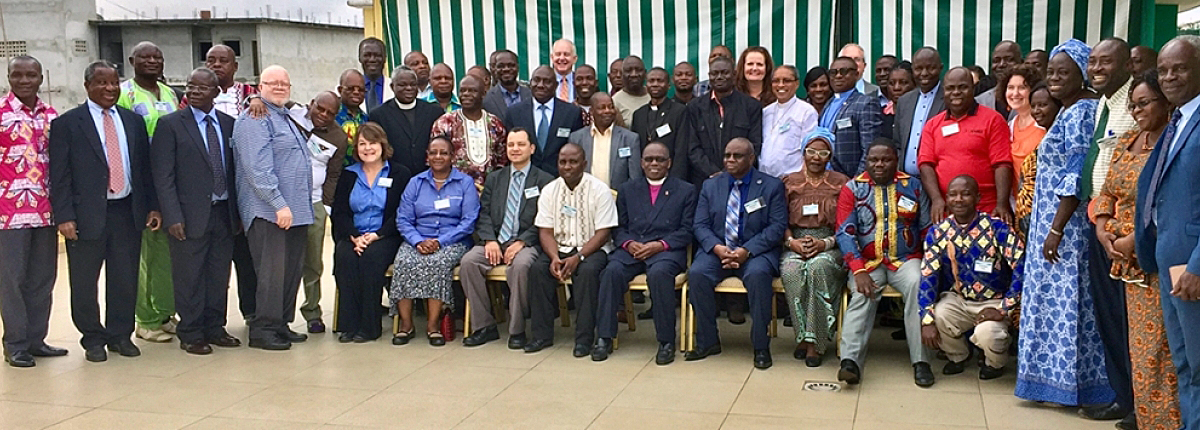Officials from United Methodist higher educational institutions and theological schools in Africa voted at a meeting here to establish a body that will review the educational institutions in Africa to ensure consistency and quality.
The model adopted is similar to the University Senate, an elected body that determines which schools, colleges, universities and theological schools in the U.S. meet the criteria for listing as institutions affiliated with The United Methodist Church.
The African Association of United Methodist Theological Institutions and the African Association of Methodist Institutions of Higher Education adopted the model proposed by the International Association of Methodist-related Schools, Colleges and Universities. They elected a committee to adapt this model to the African context, according to a press release from the United Methodist Board of Higher Education and Ministry.
Areas for assessment and standardization include governance, church-relatedness, academic excellence, technological advancement and financial sustainability, the press release said.
More than 60 people from nearly a dozen African countries gathered for the Sept. 18-22 meeting at the Maison de l’Espérance, the Côte d’Ivoire United Methodist owned-hotel.
The African meeting was intended to be practical and serve as a framework to exchange experience. The meeting was also an effort to provide mutual support and cross-promotion of the shared goals and work of the associations to enhance and expand access to quality Methodist education throughout the continent of Africa.

The African Association of United Methodist Theological Institutions and the African Association of Methodist Institutions of Higher Education met in Abidjan, Côte d’Ivoire, with the goal of creating mutual support for shared goals and expanding access to quality Methodist education throughout Africa. Photo courtesy of the United Methodist Board of Higher Education and Ministry.
With the support of the Global Education Office at the United Methodist Board of Higher Education and Ministry, the associations began meeting jointly in 2013 to address the specific needs and explore the opportunities for theological and higher education in Africa.
The meeting included an e-reader training. The E-Reader Project is a joint effort created in 2013 by Discipleship Ministries and Higher Education and Ministry, providing thousands of e-readers around the world. So far, this project has focused on specific programs, “E-Readers for Theological Seminaries” and “E-Readers for Global Health Education.”
Based on the success of the project for theological seminaries, the presidents of the main Methodist universities on the continent of Africa began discussing the possibility of developing a new project focused on higher education.
Leaders of Africa University, Kenya Methodist University, United Methodist University of Liberia, Methodist University of Angola, Methodist University of Côte d’Ivoire, Methodist University of Mozambique, Katanga Methodist University, Kamina Methodist University, Methodist University of Wembo-Nyama, Kindu Methodist University and the United Methodist University in Sierra Leone have been in conversations since 2016 to discuss this subject.
The costs for the higher education e-reader program will be included in tuition costs for the participants.
Participants involved in meetings on the E-Reader Project also attended a workshop on the Central Conference Theological Education Fund led by Greg Bergquist, top executive at Higher Education and Ministry’s Division of Ordained Ministry. The session focused on concrete projects involving publications and faculty exchange.
The group also celebrated the 25th anniversary of United Methodist Africa University.
Other topics that will be addressed at future meetings included a Journal of Education for central conferences in Africa, a faculty exchange program among theological institutions in Africa, the need for women in leadership positions in higher education and scholarship programs and publications.
Other topics discussed during the six-day meeting included a discussion on the impact that the work of the Commission on a Way Forward will potentially have on higher and theological education in Africa, the creation of the joint efforts to expand and effectively fundraise, and empowering and promoting pan-African development across the associations.
The theological schools association, which includes 25 institutions, elected the Rev. James Labala of Liberia as its new president for the 2017-2019 period. The higher education association, which includes 20 colleges and universities, elected Kandolo Kasolwo Ilunga of the Democratic Republic of Congo as its secretary. Both associations voted to have their next joint meeting in Angola in 2018.
Participants also had the opportunity to learn more about the United Methodist Church in Côte d’Ivoire. They worshipped at different congregations in Abidjan, took part in a welcome dinner offered by Bishop Benjamin Boni, and visited the campus of the Methodist University of Côte d’Ivoire.
This story was compiled from a press release by The United Methodist Board of Higher Education and Ministry and a story by Dominique Tayoro, the communications director for The United Methodist Church in Côte d’Ivoire.
Like what you're reading? Support the ministry of UM News! Your support ensures the latest denominational news, dynamic stories and informative articles will continue to connect our global community. Make a tax-deductible donation at ResourceUMC.org/GiveUMCom.




